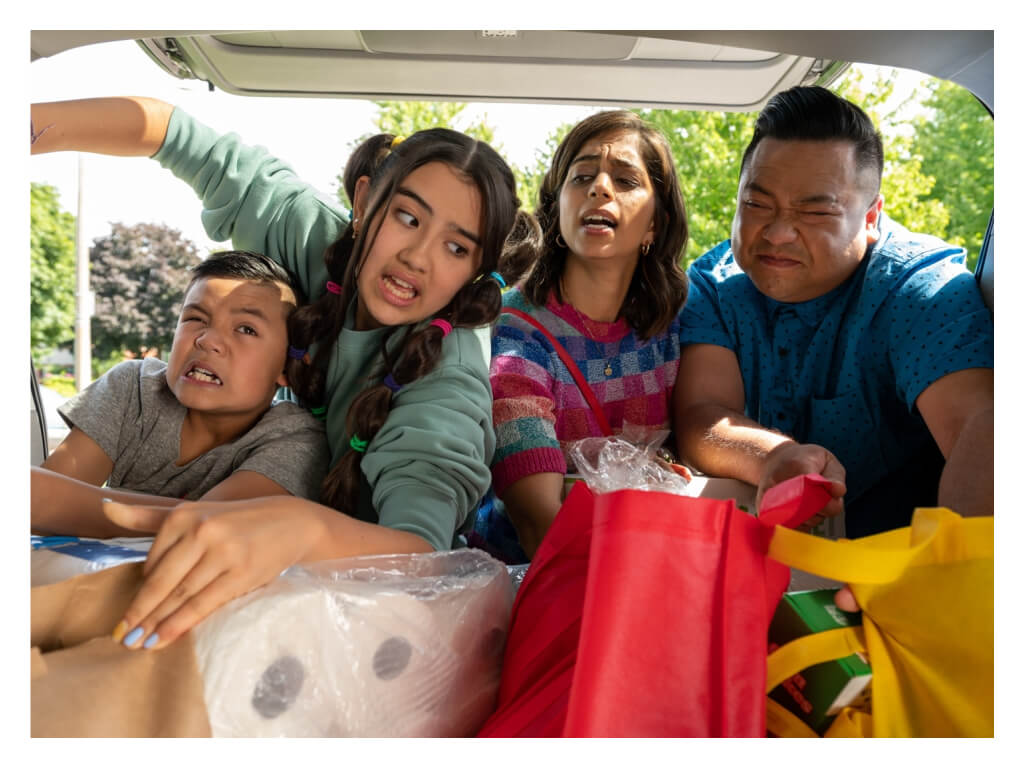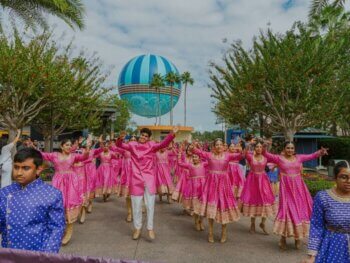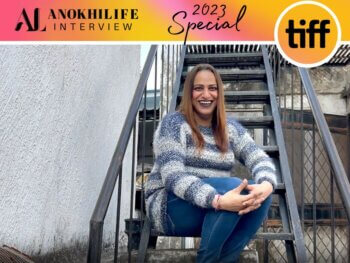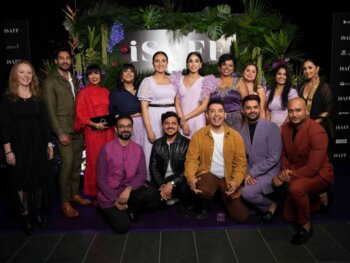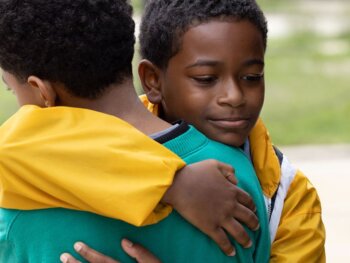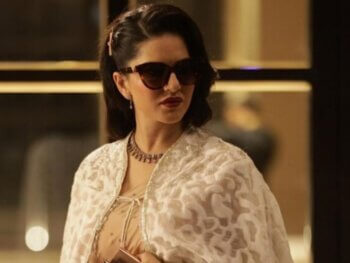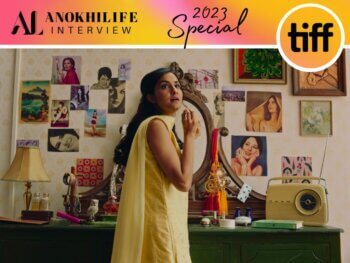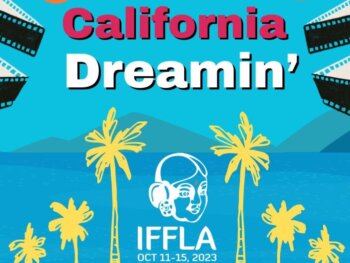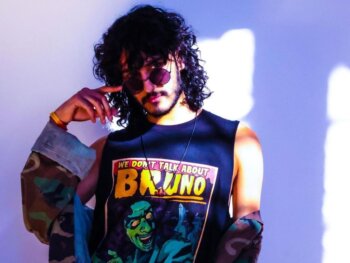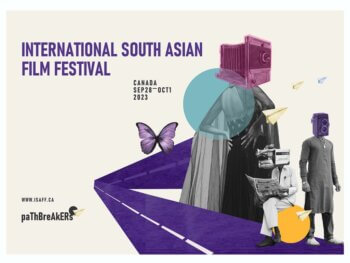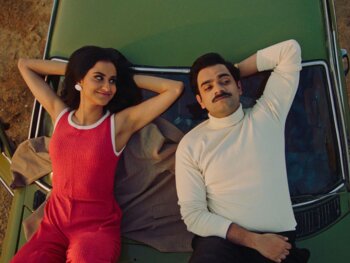Already raking in critical acclaim, CBC’s new family comedy Run the Burbs is giving some major vibes as one of (if not THE) hottest shows of 2022. Starring and co-created by Andrew Phung (of Kim’s Convenience) and Rakhee Morzaria (who also serves as one of the writers), this series follows a quirky, fun-loving South Asian-Vietnamese family as they strive to live their best lives in suburbia. We chat with this creative duo about how comedy differs from drama as a tool for representation on TV, the unique (and timely) depiction of a South Asian and East Asian family, and their lively take on suburban life.
The New Year brought with it a new TV family for us all to chuckle along with, as Run the Burbs introduced audiences to Andrew and Camille Pham (Andrew Phung, Rakhee Morzaria), a Vietnamese-South Asian couple raising their two young kids (Zoriah Wong, Roman Pesino) in the heart of suburbia.
He’s a stay-at-home dad, she’s an enterprising business exec. And whether they’re drag-racing to secure permits for a block party or debasing themselves to make friends with the new neighbours so they can take advantage of their coveted pool, the Phams tackle the endless absurdities of the ’burbs together, always having each other’s backs.
In addition to starring, Kim’s Convenience alum Phung is also the show’s co-creator, while Morzaria is a member of the writers’ room. Ahead of the show’s January 5 debut, Anokhi Life got to Zoom-chat with the pair about their distinctive, high-energy vision of suburban life, and creating a sitcom couple that really stands out from the crowd.
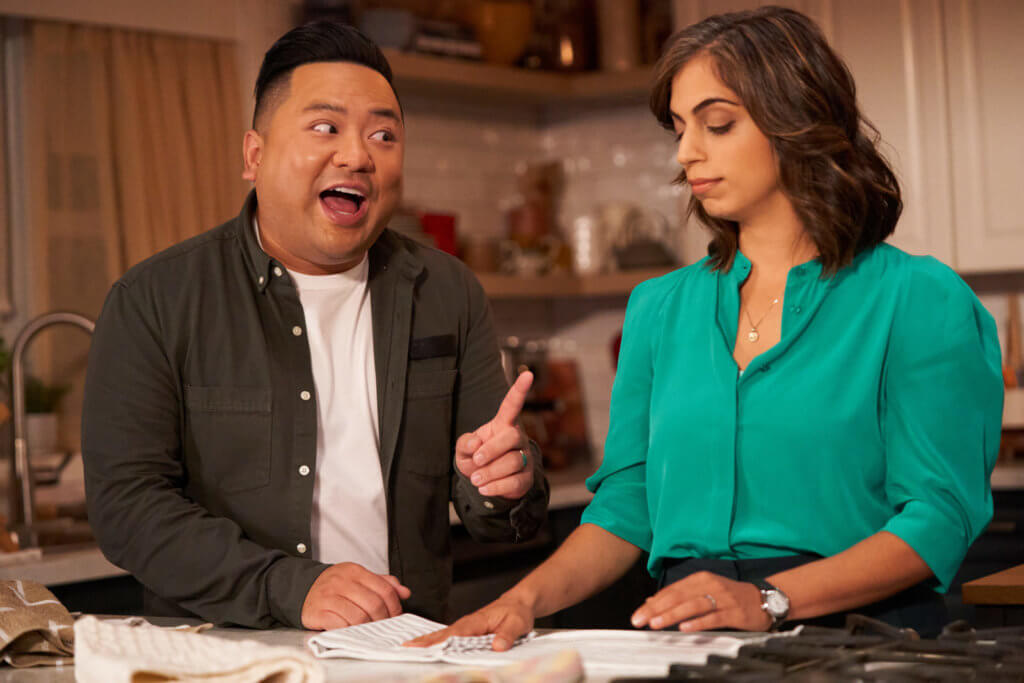
Matthew Currie: Take me through the genesis of Run the Burbs.
Andrew Phung: It was a show that [co-creator] Scott Townend and I developed together. It was based on the idea of, we both grew up in suburbs, and the suburbs had always been portrayed in a bit of a mundane and boring way. And we thought it’d be fun to really highlight the suburbs as a place that we saw them — a place that was so energetic and full of life. Then taking a bit from my world, of a family with young kids in the modern day and age. And really . . . as opposed to the struggles of family, to celebrate this family taking on the world together.
MC: Rakhee, you started out as just one of the writers. Was it in your mind from the start that you might be right for Camille?
Rakhee Morzaria: It was honestly not at all on the radar [laughs]. Because I entered as a writer, and it was really about supporting Andrew’s idea and supporting his vision and finding a way that we could blossom that into something that’s never been seen on television, hopefully, before. So, my mind was very much about breaking story and coming up with the fun and funny things that could happen in the suburbs. It never really occurred to me at all that I would even be auditioning for Camille, until I got the audition from my agent. And then prepping for that was really interesting, because I felt like I knew who Camille was, but [as writers] we were looking at story in a totally different way . . . in more of an outside-inward way, and when I work as an actor, I’m thinking inside-out. So I had to really separate those two things from myself, and then come into the role and think about, “How can I make this mine?” How can I have fun with this and create a three-dimensional character that I feel has a piece of me but also pays homage to the story and the world that was built?
AP: The really interesting thing, Rakhee, as you say that, is when you auditioned for the role, you did things to the character that we never talked about in the room. My point of view on the character changed when you auditioned. Because you did things that were like, “Oh, I didn’t expect that. Is that who Camille is now?” Not only did you help develop the character in the room, but you were able to explore the character individually in a way that I don’t think any of us could’ve ever done.
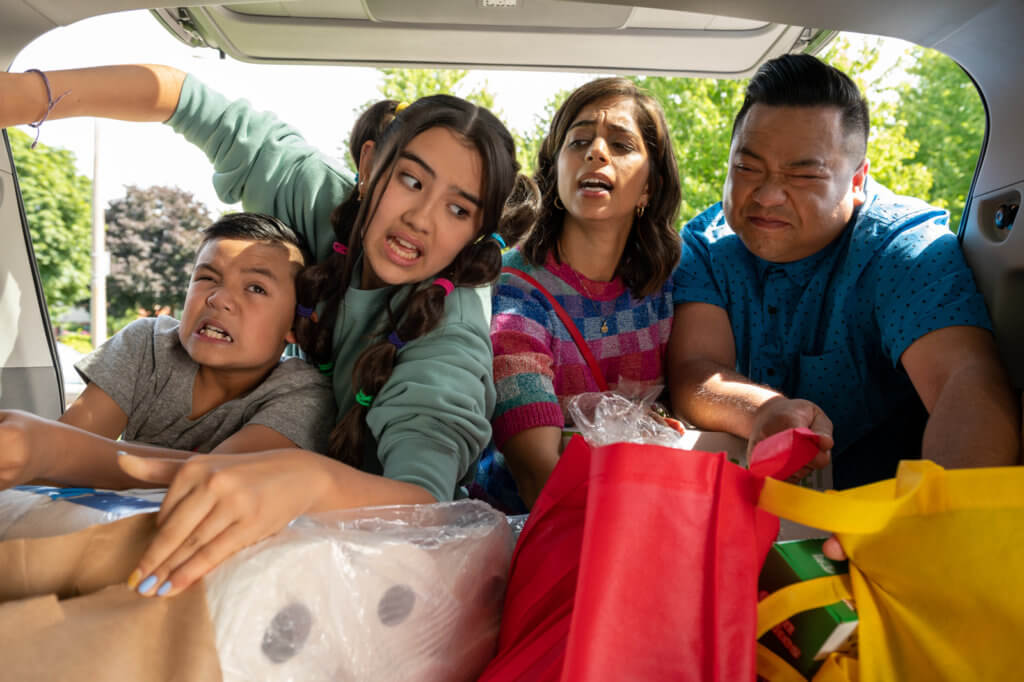
MC: One of the things that struck me about the show is how these situations that the family deals with — securing permits for the block party, making friends with the new neighbours who have the pool — the stakes are so low, but the more the characters invest in them, the funnier it gets.
RM: Being someone who went back during the pandemic and staying with my parents, I had a totally different relationship to the suburbs going back as an adult and living there for, like, a solid couple months. Just the stories and the things that were going on with them — you do find yourself just finding fun in the everyday. And I think that that’s something so beautiful about this family is that they’re so full of joy, they love where they’re living, they love their family and they go hard with everything [laughs].
Like, a new restaurant opening IS a big deal. That is a true thing when you’re in the suburbs. When I’m at my parents’ and they’re like, “There’s this new Indian place, everyone’s talking about it.” And we’re like, “OK, what do we order?” Just breaking down the menu is a whole-evening affair. I don’t think that’s boring! Honestly, I think that’s fun. And then we sit around and we rate the food. We’re like, “OK, 1-10, what do you think of this?” So yeah, I think it’s just bringing the fun of the suburbs to the audience.
AP: This family also sees their life like a movie. And we try to really get that across with a lot of the little movie homages, references. Especially that cold open, where they’re getting groceries to the door [in one trip], it is like a war movie scene. They’re just trying to get everything in. So, it’s like taking the really relatable things from the ’burbs, giving them energy and then maybe putting movie references in to heighten it, to really make it big for the audience.
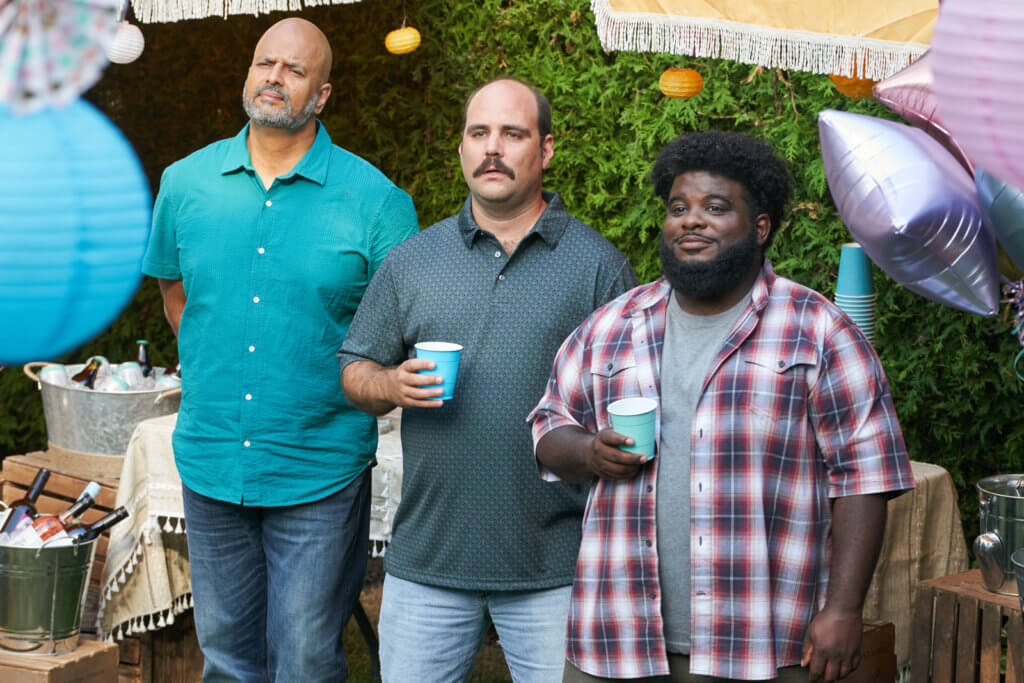
MC: The soundtrack plays into that heightened quality as well . . .
AP: Rakhee and I were always like, “This show’s gonna have a dope soundtrack” [laughs]. And because this family is a family you’ve never seen before, we wanted to feel alive. We wanted the suburbs to feel alive, in such a really engaging and organic way . . . we just want to make the show feel bumpin’ the whole time.
MC: What makes Camille and Andrew stand out as a couple, compared to other TV sitcom marriages we’ve seen?
RM: I think, above all, they really support each other. I think sometimes we’ve seen iterations of families of the wife and the husband having different parenting techniques or going to bat against certain things and there being character rifts that draw out the storyline. Whereas I find what makes this family very unique and very honest and, I think, a gorgeous representation of modern love, is that they are a team.
There is something really wonderful about also showing a family where it is the wife that’s going to work and doing that corporate job, and the other parent is at home looking after the children. I don’t know that you often see that. I can’t remember when I’ve seen that on television. I think that’s progressive and that’s a real partnership.
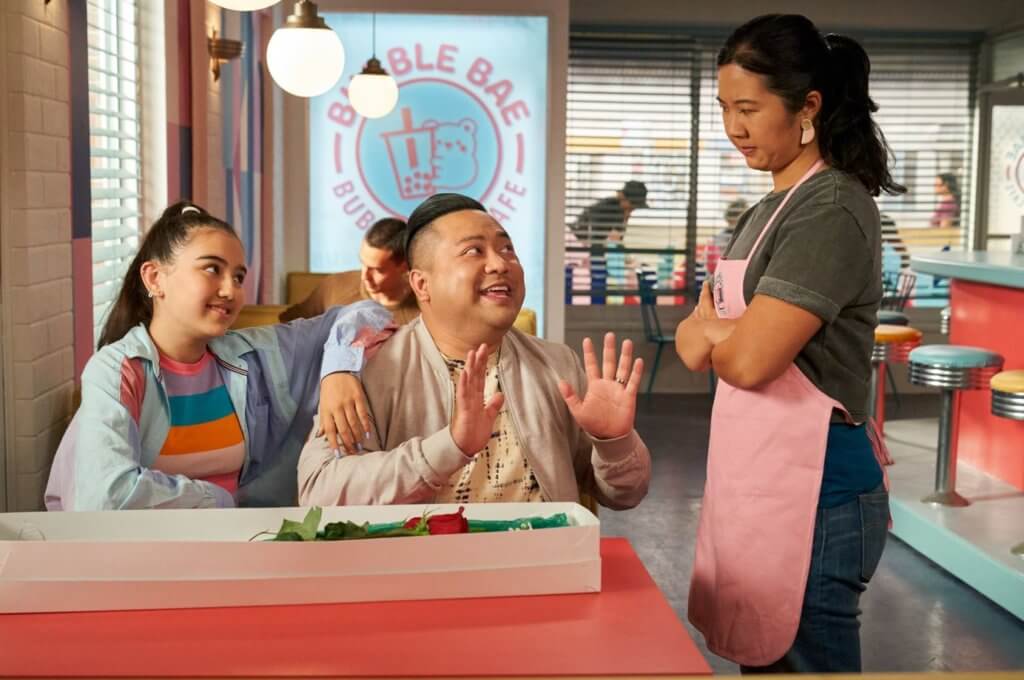
MC: There’s a lot of talk about representation today, but representation through comedy as opposed to drama is a very unique and sneakily powerful thing.
RM: Oh yeah. First of all, I have to say, Indians are very funny [laughs]. I don’t know if you’ve ever been to an Indian wedding, but they are four hours long and every uncle thinks that he is a standup comedian, and you will just hear jokes being thrown out as the pandit is going on marrying these two people. It is like an open mic of uncles. So, I feel like it’s about time, in a way! Because this is an audience that is ready for some comedy and is ready for some representation in that way.
But yeah, we can have fun, real, honest conversations on this show, and have fun with it, without it feeling too heavy or without it feeling like it is about representation. It’s just a world you enter, and you’re like, “Great, cool, love it.” It’s not like, “Hello everyone, and welcome to the show that is about a South Asian woman and a Vietnamese-Asian man and now they’re together and this is how it works and this is how it doesn’t work.” No, it’s jokes all the way.
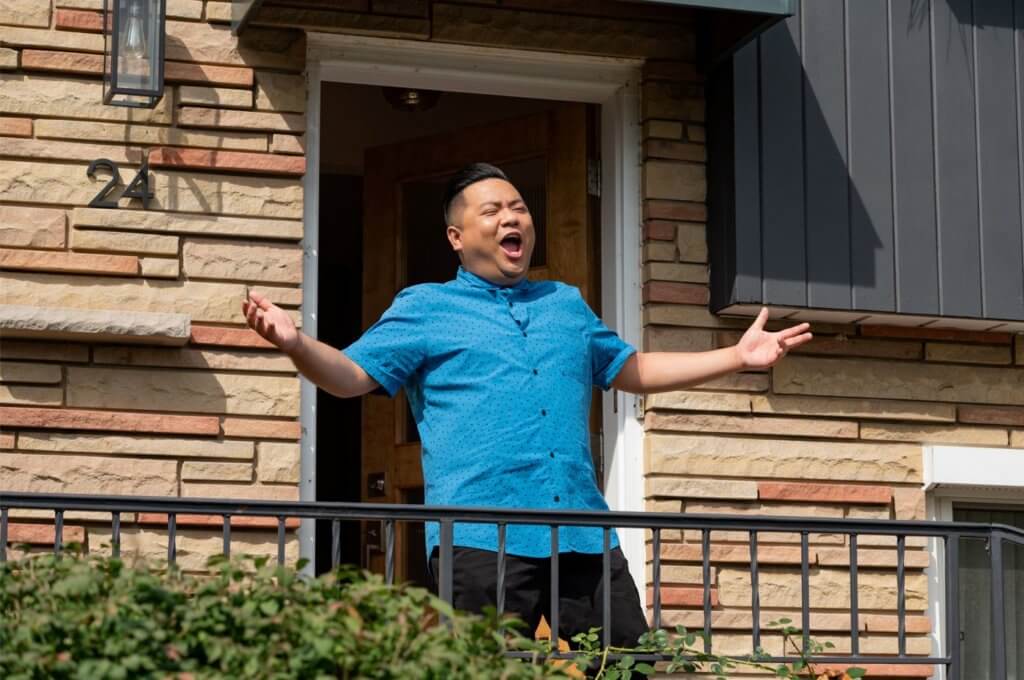
AP: That’s great — Rakhee talking about Indian weddings. Season two, that’s all I want now. It’s interesting because, this discussion of our Asian-ness was something we had in the room, and we knew it exists, but what we really wanted was to make a show reflective of the children of immigrants raising kids. And we have been raised in North America. So we’re raising our kids with half of ourselves in this new country, but then our other half in the old country via our parents.
And Rakhee, I’ll never forget, when we were in the writers’ room, you were sharing that story of a tradition you had in your family, and someone’s like, “We gotta get the candle!” And someone’s like, “What’s the point of the candle?” And then no one could answer that question. Everyone’s like, “Well, we don’t know, we just gotta do the thing.” So for us, there is an opportunity to reflect on our exploration of culture and how we adapt it for ourselves and how it’s kind of changing throughout . . . and instilling it upon our kids.
Run the Burbs airs Wednesdays at 8:30 p.m. on CBC.
Main Image Photo Credit: CBC
Matthew Currie
Author
A long-standing entertainment journalist, Currie is a graduate of the Professional Writing program at Toronto’s York University. He has spent the past number of years working as a freelancer for ANOKHI and for diverse publications such as Sharp, TV Week, CAA’s Westworld and BC Business. Currie ...


















































